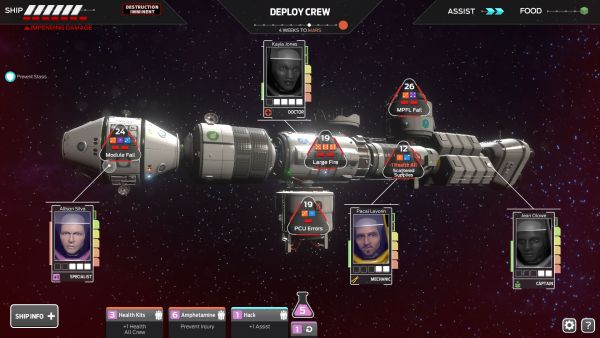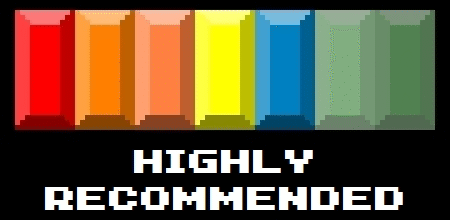
Five weeks ago, my ship was struck by a micrometeoroid storm that killed two of the six crew and irreparably damaged the ship. Since then, two more crew members have died and been cannibalised (we ran out of food), and many of the ship’s systems have gone offline. The two remaining crew members are hungry, tired, very badly injured, and still five weeks from Mars. Relatively speaking, things are going pretty well.
Tharsis is a board game with teeth. Every decision you make will feel the best of a bad bunch, and even then you might roll snake eyes and be locked out of making that decision. Tharsis is really, really hard, and the fact that your ability to act is based on dice rolls means that even if you are a strategic genius, you can still end up with a dead crew seven weeks away from Mars.
Platforms: PC, PS4 (Version Played)
Publisher: Choice Provisions
Developer: Choice Provisions
Genre: Strategy Board Game
Release Date: January 12, 2016
ESRB Rating: Mature
 Video games often create excitement through a kind of false peril, an artfully constructed feeling of danger. The Uncharted series has built an incredibly successful franchise out of set pieces that make the player feel as though they are never more than a hair’s breadth away from death, and while these are very effective, they are essentially problematic because the player eventually realises that Nathan Drake is never actually in danger. The hero always leaps from the train in the very last moment before it goes off the cliff, and this pattern occurs with such frequency that most games never really create the feeling of danger that is so key to excitement.
Video games often create excitement through a kind of false peril, an artfully constructed feeling of danger. The Uncharted series has built an incredibly successful franchise out of set pieces that make the player feel as though they are never more than a hair’s breadth away from death, and while these are very effective, they are essentially problematic because the player eventually realises that Nathan Drake is never actually in danger. The hero always leaps from the train in the very last moment before it goes off the cliff, and this pattern occurs with such frequency that most games never really create the feeling of danger that is so key to excitement.
In Tharsis you really are in danger. That room that’s filling with gas that will kill you if you don’t escape? You’ll end up stuck in it. And that module that has to be repaired to stop the ship from blowing up? You won’t repair it in time. In Tharsis, your crew die so often that those unbelievable escapes actually feel shocking, and if you do manage to get one of them to Mars, you’ll watch the ship exploding in your wake and wonder how you even got one of them out alive.
Every game of Tharsis begins the same way: your crew of six are ten weeks away from Mars when everything goes wrong. Two of the crew are killed, food supplies are running low, and the ship is badly damaged and getting worse. You’ll have to spend the next ten weeks (or turns) scrabbling to keep the ship repaired and the crew healthy in the hope that even one crew member might reach Mars alive. You do this by moving the remaining crew members around the ship, rolling dice to repair modules, and using the special abilities of crew members to get bonuses that will help you later on. You will never fully repair the ship, never have enough food, never completely calm and heal your crew; instead, you’ll have to decide whether to repair that module that is slowly killing your crew, or to harvest more food that will allow your crew to be more productive in the next few turns.

Every turn is a challenge to pick the few best options from a huge collection of terrible options, and you’ll often make a decision in turn two that you realise was actually an awful idea in turn five when all of your crew are stuck in the medical bay and unable to repair the operations module. A complete game of Tharsis will last ten turns, but most of the time you’ll feel lucky if you make it past week five, and having such short games means that this feeling of having irreparably and unknowingly screwed yourself over right at the start feels educational rather than frustrating. Every game of Tharsis feels like it teaches you how to get closer to Mars, and you’ll be itching to jump back in after watching your ship explode, feeling that, if you just do one little thing differently, this new game might be the time you make it to the red planet.
With its resource management, pawn movement, and dice rolls, Tharsis is essentially a board game. One of the most important parts of why Tharsis works so well is that rather than simulating dice rolls by randomly generating a number like many other games, Tharsis actually simulates the dice as physical objects, throws them across the board, and reads the numbers that they land on. This addition to the game is so simple and effective that it’s hard to imagine why nobody has done it before, as it gives the satisfaction of rolling dice and the feeling that every turn, even when all five dice come up ones, is fair.
With the rise of masocore games and roguelikes, the industry is currently facing a glut of difficult games, but the fact that Tharsis asks you to surrender so much of your ability to succeed to chance means that it still feels difficult and dangerous even when you’ve put 20 hours into it. This isn’t to say that you can’t get better at Tharsis, it is simply that you can’t really get good at Tharsis, or rather that you’ll never have a perfect run the way that you might in The Binding of Isaac or Nuclear Throne. Tharsis stays fun and exciting by teaching you just enough with each attempt that you’ll be sure that you know how to beat it, and yet just as soon as you rush back in to implement your new plan, the game will throw another curve ball at you that turns the whole mission into a desperate attempt to survive. Tharsis feels like it’s always one step ahead of you, daring you to have another go at getting to Mars. And even though you know all your ideas will fall apart in the moment of execution, you can’t wait to jump back in and have another go.

Review Disclosure: A retail copy of Tharsis was purchased by Warp Zoned for the purposes of this review.






